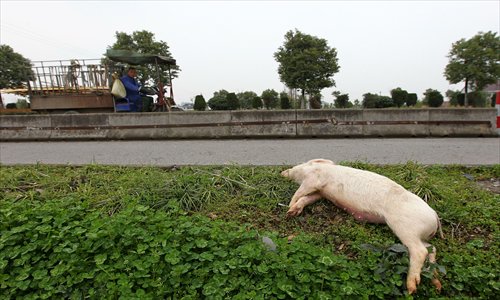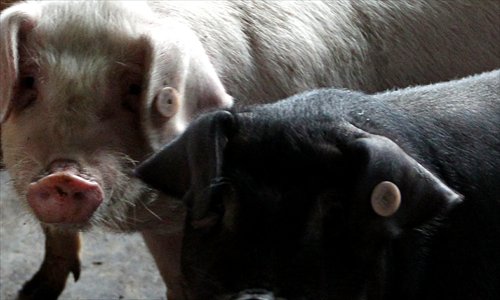Dead pigs traced back to Zhejiang

Most of the nearly 3,000 dead pigs that authorities have pulled out of the Huangpu River were raised in Jiaxing, Zhejiang Province, the municipal government said Monday.
The mysterious incident has sparked questions about how dead livestock ended up in the river, and has aroused concerns about the safety of the city's water supply, as the carcasses have been found floating in the upper reaches of the Huangpu River, a source of tap water for Jinshan, Songjiang, Fengxian and Minhang districts.
Workers from the Shanghai City Appearance and Environmental Sanitation Administration had removed more than 2,800 pig carcasses from the upper reaches of the Huangpu River by Monday evening, according to a post on the Shanghai Municipal Government's official microblog.
The municipal water authority has increased the frequency of its regular tap water testing to once every four hours and has assured residents that the tap water is safe to use.
Residents discovered the dead pigs Thursday in the Hengliaojing Creek, only a few kilometers away from a local water treatment plant, the news website xinmin.cn reported.
An animal disease control center lab under the Shanghai Municipal Agricultural Commission tested five carcasses for six viruses and diseases commonly found in pigs. One animal tested positive for porcine circovirus, a virus not harmful to humans, just pigs.
Nonetheless, there is still a possibility that the public's health could be at risk, according to an expert from the Shanghai Academy of Agricultural Sciences who preferred not to be named.
"What if the pigs were carrying other viruses that are transmittable to humans - for example, salmonella?" the expert told the Global Times.
It still remains unclear whether all of the dead pigs were raised in the same farm or area. Songjiang district agricultural authorities said some pigs were raised in Jiaxing, a city sandwiched between Shanghai and Hangzhou, Zhejiang Province, and others were from Jiangsu Province, xinmin.cn reported.
The Songjiang District Environmental Protection Bureau dispatched a barge and traced the pigs back to the Pingshen Waterway in Pinghu, which is part of Jiaxing. However, the ear tags used to identify the pigs were unclear, so Pinghu authorities said that they remained unsure if local farms had dumped the carcasses into the river.

"The ear tags were vague, and some were scratched up because farmers know that it is illegal to dump dead pigs in the water. It will take time to figure out their source," a press officer surnamed Mo from the Pinghu city government told the Global Times.
Mo said that the majority of the pigs could be from Nanhu district in Jiaxing city, which is famous for raising pigs.
The Pinghu water authority has collected more than 600 pigs. The ear tags showed that the pigs were from Nanhu district in Jiaxing, according to a news report on a Jiaxing news portal.
Shanghai authorities are asking Zhejiang Province authorities to prevent local farmers from dumping dead pigs into river. The authorities pointed out that Jiaxing-based media reported that farmers had dumped the pigs in the river out of convenience, rather than dispose of them properly.
It is not the first time that Jiaxing farmers have dumped dead pigs into nearby rivers. However, a local farmer said more farmers have been dumping dead animals this spring since police cracked down on the illicit dead pig trade last year, Jiaxing Daily reported.
The Shanghai Food Safety Committee Office has announced that authorities have stepped up safety inspections and have not found any pigs in circulation that died of disease.
Zhejiang Province agriculture authorities said many of the pigs died last month due to the cold weather, the China News Service reported Monday.
Mo said that the majority of the pigs could be from Nanhu district in Jiaxing city, which is famous for raising pigs.
The Pinghu water authority has collected more than 600 pigs. The ear tags showed that the pigs were from Nanhu district in Jiaxing, according to a news report on a Jiaxing news portal.
Shanghai authorities are asking Zhejiang Province authorities to prevent local farmers from dumping dead pigs into river. The authorities pointed out that Jiaxing-based media reported that farmers had dumped the pigs in the river out of convenience, rather than dispose of them properly.
It is not the first time that Jiaxing farmers have dumped dead pigs into nearby rivers. However, a local farmer said more farmers have been dumping dead animals this spring since police cracked down on the illicit dead pig trade last year, Jiaxing Daily reported.
The Shanghai Food Safety Committee Office has announced that authorities have stepped up safety inspections and have not found any pigs in circulation that died of disease.
Zhejiang Province agriculture authorities said many of the pigs died last month due to the cold weather, the China News Service reported Monday.
Related reports:
Coming clean on pollution
Huangpu dumped pig toll nears 6,000
Pig pollution shows urgent need to ensure water quality
'Pig Delta'
Dead pigs threaten waterway